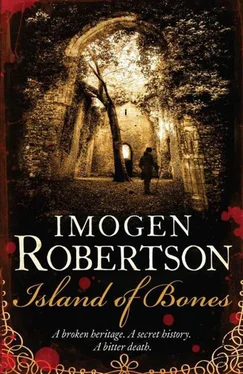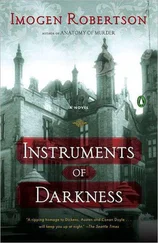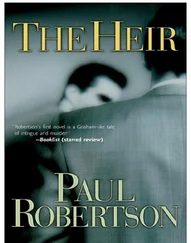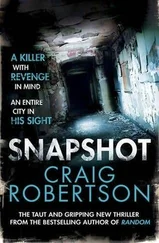Imogen Robertson - Island of Bones
Здесь есть возможность читать онлайн «Imogen Robertson - Island of Bones» весь текст электронной книги совершенно бесплатно (целиком полную версию без сокращений). В некоторых случаях можно слушать аудио, скачать через торрент в формате fb2 и присутствует краткое содержание. Год выпуска: 2011, ISBN: 2011, Издательство: Hachette Littlehampton, Жанр: Исторический детектив, на английском языке. Описание произведения, (предисловие) а так же отзывы посетителей доступны на портале библиотеки ЛибКат.
- Название:Island of Bones
- Автор:
- Издательство:Hachette Littlehampton
- Жанр:
- Год:2011
- ISBN:9780755372058
- Рейтинг книги:3 / 5. Голосов: 1
-
Избранное:Добавить в избранное
- Отзывы:
-
Ваша оценка:
- 60
- 1
- 2
- 3
- 4
- 5
Island of Bones: краткое содержание, описание и аннотация
Предлагаем к чтению аннотацию, описание, краткое содержание или предисловие (зависит от того, что написал сам автор книги «Island of Bones»). Если вы не нашли необходимую информацию о книге — напишите в комментариях, мы постараемся отыскать её.
Island of Bones — читать онлайн бесплатно полную книгу (весь текст) целиком
Ниже представлен текст книги, разбитый по страницам. Система сохранения места последней прочитанной страницы, позволяет с удобством читать онлайн бесплатно книгу «Island of Bones», без необходимости каждый раз заново искать на чём Вы остановились. Поставьте закладку, и сможете в любой момент перейти на страницу, на которой закончили чтение.
Интервал:
Закладка:
Ham cleared his throat. He was standing at Harriet’s elbow and looking rather sternly at Felix. He rolled his great shoulders. Felix lifted his hand from her arm, and Harriet walked briskly into the house.
Mr Askew’s apartments showed him to have been an orderly sort of man. There were a pair of armchairs round the fireplace in red leather and a number of well-stocked bookcases. The room was dominated, however, by Mr Askew’s worktable on which he produced his plans of the surrounding countryside. Inks and stone for grinding them lay next to an astrolabe in a walnut case. The table had large candlesticks at each end, and though they were burned to stubs, Crowther could see Mr Askew used beeswax candles to work with. Again he had a rather painful sense of fellow feeling.
Of the portrait that Crowther had glanced at there was no sign. Rifling through the man’s desk he found a great many cuttings from the newspapers advertising or reporting on his various entertainments, and boasting of the number of visitors of quality from many European countries whom he had welcomed into his museum. It had not been so when Crowther was a child. No one came here then, and the town had been miserable and poor. He picked up the astrolabe, which was beautifully made, and considered his father. The land he had bought he had used purely to create the wealth Crowther now enjoyed. He had cut down the timber, worked the last deposits he could from the mines and invested the profits elsewhere, where it could do no good for these people. For that, they had made him a peer of the realm. Mr Askew may have been an awkward man at times, but he had brought visitors and their money into Keswick, he had unpicked the history and geography of the area and made it available to his fellow men. Crowther had sneered at him, and now he lay dead among his exhibits, another bloody story among so many others.
Crowther closed his eyes briefly and put down the astrolabe. If Mr Askew’s married sister permitted it, he would buy the instrument himself and place it on his own worktable to remind him. He remembered that Harriet had purchased a violin from the estate of another man who had died violently. Perhaps they deserved the reputation as carrion birds that some were keen to give them.
The notebooks Crowther found were full only of sketch maps and measurements. Mr Askew, it seemed, had not kept a journal of his thoughts. There was no note, no letter. Crowther leaned back in the chair and half-closed his eyes. He was trying to recall, in each detail, the portrait of James Westerman, Harriet’s late husband, that hung in the drawing room in Caveley. It was a sort of exercise before he made an attempt on recalling the glimpsed portrait of Lord Greta. The oil of Captain Westerman showed him in a version of Captain’s undress uniform — a vigorous, handsome man, with the sea churning behind him. It was painted, Mrs Westerman had told him, just before their marriage and shortly after he had achieved the rank of Captain. His barge bobbed off a little to the left in reference to his new position; he had his sword in front of him like a cane. The painter had given the impression of intelligence and humour to his expression. Crowther wondered briefly what the same painter would make of his own angular, ageing self. Would he be painted with a knife in his hand? Darkness behind him, his face made even more haggard by the candlelight by which he always worked? Well, such were his signs. Just as the barge, hat and sword were those of the late Captain.
Crowther opened his eyes again. He saw Mr Askew in front of him as he glanced up; the portrait had been almost life-size, and by the way Mr Askew had held it, it seemed he and Greta were looking at each other, turned slightly away from the viewer, one arm forward. A profile, and what were the signifiers there? A ring. The landscape behind him. On the waistcoat, an elaborate chatelaine. Crowther saw it, placed his hand on his forehead and thought. He had seen it before.
He stood up so quickly that Mr Askew’s chair tipped over behind him.
V.5
London, the same day. Office of Mr Palmer in the Admiralty Building, Whitehall
Mr Palmer saw a great deal of correspondence cross his desk at the Admiralty; however, it was unusual to find an envelope addressed to him personally. His rather shadow-strewn professional career meant he was hardly acknowledged to be what he was, a man of growing influence and stature in that place. Usually those who wished to communicate with him did so in person or via some intermediary, rather than committing themselves to paper. Yet here was an express with his name plainly written on it, handed to him as the late afternoon began to settle into twilight. His first action on receiving the packet was to check the seal for signs of tampering, then having reassured himself on that point, he closed the door to his outer office where his clerks were busily at work and returned to his desk.
It might have been supposed that Mr Palmer would have had to find work elsewhere when the government of Lord North collapsed in the wake of the Yorktown fiasco, or when Earl Sandwich was replaced as 1st Lord of the Admiralty by Howe. He had not doubted the security of his position long. He knew too many secrets, secrets too old and varied to be spurned by any man of sense, and the new 1st Lord was wise enough to aim to win the favour of Mr Palmer rather than estrange him.
He opened the letter and looked first at the upright signature with which it was concluded. The look of suspicion left his face and was replaced with a smile. He turned back to the beginning of the letter and began to read. The smile became a frown. After some moments he set the paper down and turned his chair to examine the view behind him. It showed a busy courtyard in the heart of the capital, and beyond it the Mall. The heat of the summer had thinned out the Quality in Town and left the streets to men of business who could not afford to retreat to country air, and the poor who, with increasing desperation, dragged themselves up and down the streets trying to find enough citizens to buy their wares. The city stank and sweltered. The concert halls were growing dusty, the opera houses shut up. Only the pleasure gardens still gathered a crowd to walk in the evening and seek some cool in the shade of the trees, though the turf was yellowed and the musicians panted as they played. Mr Palmer saw little of what passed outside his window, however, and after a period of contemplation he stood and took up his coat.
He folded the letter into his pocket and passed through his outer office and down the main stairway. His clerks noticed his passing, but did not question it. Mr Palmer was forever coming and going with that look of concentration puckering the skin around his eyes.
Mr Palmer’s destination was a modest house located off Whitehall and within five minutes’ walk of his own office; however, it was almost an hour after leaving his office that he arrived there. He had spent some little time amongst the archives, then had made a brief stop at his own residence before coming here. It was not a place where one called without a gift of some kind. The gentleman who lived there had a taste for the antique and Mr Palmer had fetched from his rooms a reserved item from a portfolio of ancient maps. This portfolio he had bought at considerable expense some five years previously, and he had done so with the express intent of offering it piecemeal to the gentleman in Craig’s Court,
The windows on the upper storey seemed oddly set, so the house had a hunkered, mistrustful look, like an old man peering sideways under lowered lids. His knock was answered promptly though by a clean-looking young woman, who greeted him with a smile of recognition.
‘Mr Palmer! He will be glad to see you.’
Читать дальшеИнтервал:
Закладка:
Похожие книги на «Island of Bones»
Представляем Вашему вниманию похожие книги на «Island of Bones» списком для выбора. Мы отобрали схожую по названию и смыслу литературу в надежде предоставить читателям больше вариантов отыскать новые, интересные, ещё непрочитанные произведения.
Обсуждение, отзывы о книге «Island of Bones» и просто собственные мнения читателей. Оставьте ваши комментарии, напишите, что Вы думаете о произведении, его смысле или главных героях. Укажите что конкретно понравилось, а что нет, и почему Вы так считаете.












